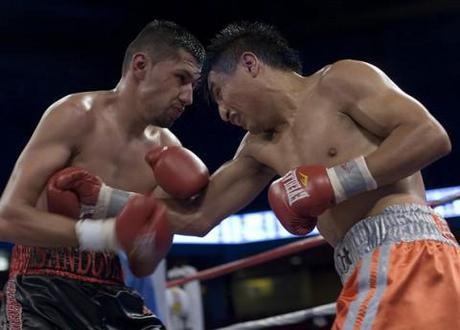
Boxers slug it out. Photo credit: kate.gardiner
The Amateur International Boxing Association (AIBA) guaranteed the oil-rich ex Soviet state of Azerbaijan two gold medals at the 2012 Olympic Games in return for massive secret payments worth $9 million. That’s according to punchy allegations made Thursday night, which were the culmination of a year-long BBC Newsnight investigation into alleged corruption in the sport. If proven to be true the allegations threaten to shame the sport of boxing and call into question the integrity of the London 2012 Olympics.
It has been claimed by a whistleblower from inside boxing that $9 million (£5.9 million) was paid to the AIBA to save the World Series of Boxing (WSB), its flagship tournament, on the understanding that the AIBA would fix it so that Azerbaijan won at least two gold medals at London 2012. On BBC Newsnight, the whistleblower claimed that the promises were made by Ivan Khodabakhsh, the chief operating officer of the WSB. “He was talking about gold medals in London in return for millions of dollars of secret payments,” the insider said. “Medals are being sold so blatantly, it’s amazing.”
“This boxing report on Newsnight is damning. The scam appears to be being run by people with all the nous of Labradors,” tweeted Caitlin Moran of The Times.
Khodabakhsh denied any involvement, saying that the allegations were an “absolute lie.” He said: “Maybe you have no idea of what’s going on in boxing, or the type of dubious people that operate in boxing.” Dr Wu Ching-kuo, the AIBA president, told BBC Newsnight that the claims were “totally untrue and ludicrous”, adding that “WSB is conducted in a totally transparent way”. Despite the strenuous denials, amateur boxing’s governing body has promised to launch an investigation into the claims. That’s been warmly welcomed by the International Olympic Committee (IOC), who do not want the upcoming Olympics marred by corruption.
“We welcome the inquiry by the AIBA and we have asked the BBC to provide evidence … we take every allegation very seriously,” IOC President Jacques Rogge told a news conference after a sports seminar in Beijing on Friday, reported Associated Press.
Deeply embarrassing. “The story could not come at a worse time for AIBA, as the World Championships begin in Baku, the Azerbaijani capital, on Monday,” argued Ron Lewis at The Times, who noted that the championships act as the main Olympic qualifying tournament, with quarterfinalists in most divisions earning a place in London. “It is deeply embarrassing for Wu, Taiwan’s representative on the International Olympic Committee, who has boasted of his success in ending corruption in the amateur code.”
Remember Roy Jones. Owen Gibson of The Guardian reminded that this is by no means the first time amateur boxing authorities has been accused of corruption: Like other sports that rely on subjective judging, Olympic boxing has previously faced allegations of one fighter being unfairly favoured over another. The most notorious incident related to Roy Jones‘ light-middleweight final against South Korea’s Park Si-Hun in Seoul in 1988.” Gibson reminded that Jones lost the verdict on a 3-2 split among the five judges despite landing twice as many punches as his opponent. All three judges who ruled in favour of the South Korean were subsequently suspended. “The allegations will put the judging in next summer’s boxing competition, for which all the tickets so far put on sale have sold out, under the spotlight,” insisted Gibson.
Scoring system is (still) dodgy (and potentially open to fixing). “The judging/scoring system in amateur boxing is one of the most contentious in sport,” insisted sports reporter Gareth A. Davies of The Daily Telegraph. “World amateur boxing is mired in smokescreens, controlled at its head by the dictatorship of Dr Ching Kuo Wu.” Davies lamented that, “the judging system is more open to question than ever before, particularly because the scores are not to be shown until the end of each of the three, 3-minute rounds.” That rule change came in in March this year. Previously, the ongoing score could be seen as the bout progressed. To score, five judges, in different positions around the ring, will depress a red or blue button, the boxers represented for one or the other of the boxers, for each scoring punch. “The obfuscation of the scores until the end of the round need not have been implemented. A grey area is only likely to become even more confusing, for both protagonists, and spectators alike.”

